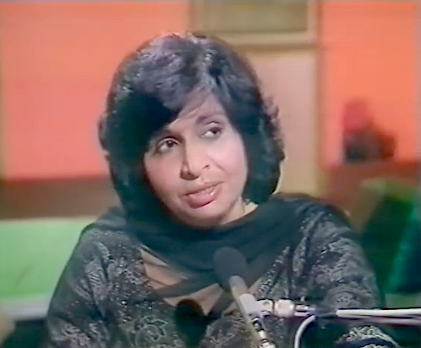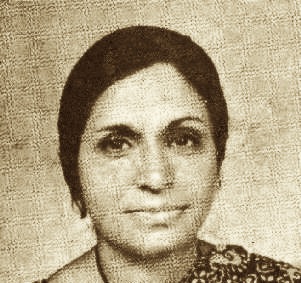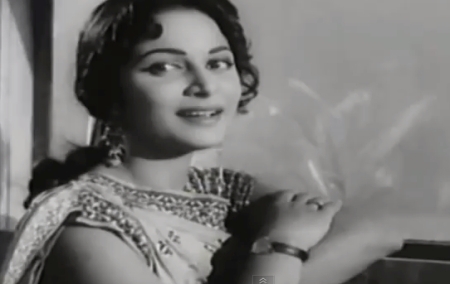Minoo Purshottam was an acclaimed Bollywood playback singer of the 1960s and 70s. She lived in the era dominated by the famous soprano sisters Lata Mangeshkar and Asha Bhonsle, fighting for the ground they couldn’t cover—and scoring! Continuing our slant of broadcasting the unsung heroes of classic Bollywood, I now introduce you to Minoo Purshottam, yesteryear songstress and incidentally, my former vocal instructor.
I spent much of my childhood in Houston where I had the pleasure of learning music from Minoo-ji in the classical Hindustani style. Before becoming her student, I knew her work well from the soundtracks of great Bollywood films I had grown up with. You may not know her name, but you’ve probably heard her songs. From “Ni Main Yaar Manana Ni” with Lata Mangeshkar from Daag (1973), “Na Na Na Re, Haath Na Lagaana” from Taj Mahal (1963) with Suman Kalyanpur, and “Huzur-e-Wala Jo Ho Ijaazat” from Yeh Raat Phir Na Aayegi (1966), Minoo-ji made an important mark among the musical legends in India.
Minoo-ji made her playback debut in Taj Mahal at the age of 16. Legendary music director Roshan took her under his wing, giving her a chance to sing a duet with Suman Kalyanpur. She recalls that she was much shorter than Suman and since in those days singers shared a single microphone during a studio recording (at Mehboob Studios, no less), she had to stand on a platform to make up for the difference!
From the daughter of a farming family in Patiala, she went on to become a singing maestro, working with composers like S.D. Burman, O.P. Nayyar, and Madan Mohan. Although she had a few occasional solos, her most famous work in films is as a partner, not a lead—always a bridesmaid, never a bride. Yet listen to how heroine-esque Minoo-ji’s voice sounds in the playful Jaidev composition “Raat Piya Ke Sang” from the lost film Prem Parbat (1973)! She toured with playback singers like Mohammed Rafi until his passing, yet when it came time to record songs for films, he was matched with Asha Bhonsle or Lata Mangeshkar. Minoo-ji waited for the female-female duets to shine.

One of classic Bollywood’s favorite female dance duets, “Ni Main Yaar Manana Ni” features the vocals of Minoo Purshottam from the hit film Daag (1973).
Eventually, Minoo Purushottam turned to non-filmi ghazals where she felt the songs could have more “meaning,” something with a more serious philosophy, and eventually left India and settled in Houston where she started teaching Hindustani vocals. Her depth in the heart-stirring ghazal Zakhm Rahguzaaro.N Ke demonstrates another aspect of her talent that may otherwise have remained hidden behind the glitzy duets of old Bollywood.
I remember her classes used to take place at an auntie’s house in the community. We sat next to each other on a keyboard bench and she played the melody as I tried to keep up with what she was singing. Minoo-ji was a strict teacher, but full of laughter and great stories—a Panjabi like me. I remember she often performed at local functions where she held her audiences captivated.

Asha Bhonsle and Minoo Purushottam join forces for the cabaret number “Huzoor-e wala” in the mystery film Yeh Raat Phir Na Aayegi (1966).
I often regret that I was too young to fully appreciate the magnitude of the legend from whom I was learning. I sometimes wish I could go back and ask her the questions on her life experiences and the inspirations that made her the fascinating artist she became. Yes, she never reached the heights of the playback singers we all associate with that era—but it is precisely because of it that I respect her more, standing her ground in a world notorious for its ruthlessness. Perhaps it was because of her innocence and much younger age that she never felt any rivalry between herself and these stars. Minoo-ji enjoyed collaboration rather than competition. And in Bollywood, that was a rare and beautiful thing.
What is your favorite Minoo Purshottam song? Let us know in the comments! For more unsung heroes of early Bollywood, check out our previous posts on costume designer Mani Rabadi and music composer Anthony Gonsalves!
– Mrs. 55









